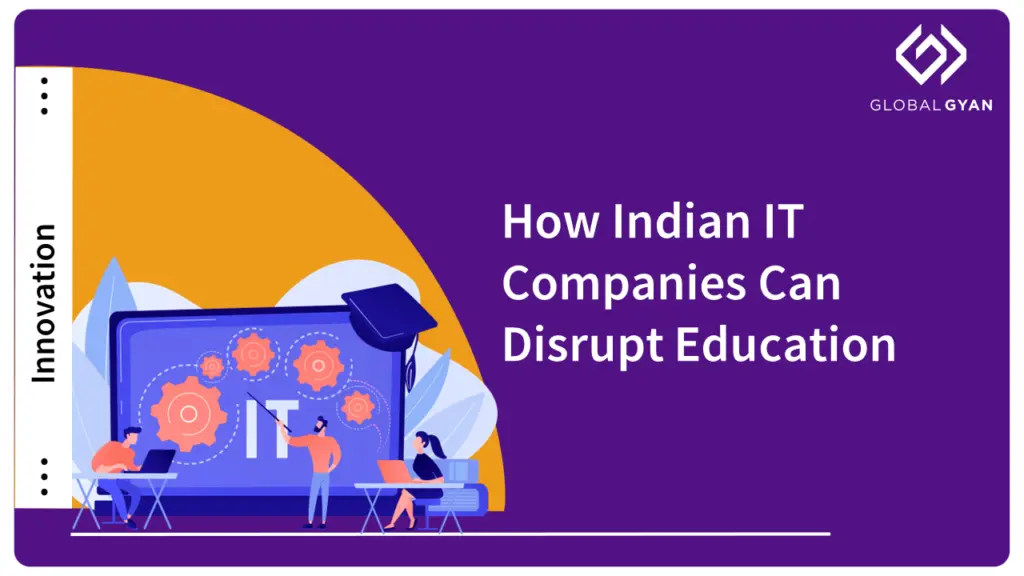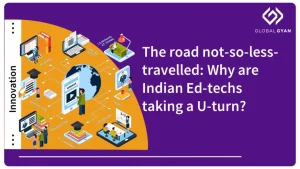How Indian IT Companies Can Disrupt Education

It is college admission time and we are outraged (again) as various Indian colleges announce their cut-off levels. A few at the Delhi University are at 100% and most are above 90%. So we will rant for a while, and like our friend Ali Haider sang many years ago say, “Yahan ka system hi hai kharab!”
Why is the cut-off at 98% or 100%? Obviously, these colleges have received applications from a sufficient number of students with those marks – else why would they create an artificial entry barrier. Earlier, these colleges didn’t have such high thresholds for entry. So why have the cut-offs crept up?
Maybe the kids are getting brighter – they have many more avenues to learn from and are therefore, smarter than ever before. Perhaps the exams are getting easier, in an attempt to make education easier and more inclusive. Whatever the reason might be, we now have a greater demand from youngsters who have scored high marks in their school exams and are seeking higher education amongst the top Indian colleges.
How can a large and increasing demand be a problem? Under normal market circumstances, more demand is good. But in education, we don’t have a normal market. While there are many colleges (supply), the problem is that there are just not enough good quality ones. Due to various regulations and controls, only the politically connected or the unscrupulous seem to be investing in expanding education facilities. The situation is so bad that many folks who have young children are wondering how much they have to save every month if they had to send their children for studies overseas.
Given that education is so fundamental to our thinking and the choices we make, I believe that no government – irrespective of ideology – will give up control . So is there no way out?
The answer could be what Idea Cellular advertised as democratising learning through the Idea Internet Network (IIN).
Is that a joke!? Wait, before you fall off your chair… here’s what I mean… let us consider the IIN concept (as shown in the ads) – that you don’t necessarily need to go to a formal college to learn the skills that are required to succeed in life. There are several, emerging options – many enabled by technology – which can substitute formal college education… it’s just that you will not get the degree.
And it is the degree granting authority of the universities / colleges that give them the power, why they are in so much demand. The degree matters, partly for the social recognition (remember that photo with a funny hat and gown), but mostly because the job market demands a degree, creating yet another entry barrier. Rarely do you come across a job that is not qualified by the degree that is necessary for it. So you see that the limited or controlled access that begins at high school continues all the way to the job market.
But, WHAT IF, what if some large company came forward and said, you know what – these degrees don’t matter much. Most of what you learn in college for 3-4 years is outdated or not connected to the job. We will test you on basic aptitude, specific skills and attitudes; we will anyway train you for a while to get you up to speed. WHAT IF a few other companies followed suit. WHAT IF the degree was no longer an entry barrier or gatekeeper to the job market.
So here’s my disruption scenario (and I wish Idea Cellular had actually, publicly played this out)… one or more corporates build institutes (or portals) of learning and certification but not degree granting. Anyone above a certain age is eligible to join based on an aptitude test, irrespective of how much they scored in any school exam (or whether they went to a school or not!). Since there is no degree, no government or university approval is required. They offer to hire all those who qualify through the programs. Soon, other corporates seeking to tap into this qualified talent pool would make competing offers to these students or set up their own such institutes. Or, as is more likely, entrepreneurs will create a mix of online/offline models of certification (think MOOC++) on the basis of demand from these corporates.
Is this feasible? I think so… there are many IT services companies which (each) hire thousands of “engineers” and then put them through months of training. What if TCS, Infosys and Wipro that hire over 50,000-70,000 freshers annually said that in 2016, 25% of our entry level hires will not require any degree, just the appropriate skills? I can tell you, just like the IIT coaching cottage industry bloomed, we will have private tutors, entrepreneurs and portals coaching young people for the job interviews.
One might argue that this is a very materialistic view of education; there’s more to it than just getting a job. True, and I am not asking that colleges and degrees be done away with. Just that for a majority of the student body, the primary purpose of education is to enable a livelihood. We need to ensure that their access to the job market through good quality education is not blocked because they haven’t scored 98% or their parents cannot afford to send them overseas.





